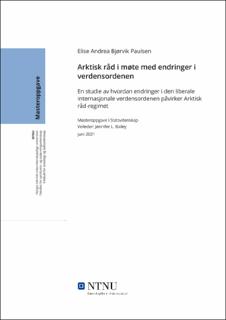| dc.contributor.advisor | Bailey, Jennifer L. | |
| dc.contributor.author | Paulsen, Elise Andrea Bjørvik | |
| dc.date.accessioned | 2021-09-28T17:34:41Z | |
| dc.date.available | 2021-09-28T17:34:41Z | |
| dc.date.issued | 2021 | |
| dc.identifier | no.ntnu:inspera:80180343:14964132 | |
| dc.identifier.uri | https://hdl.handle.net/11250/2784575 | |
| dc.description.abstract | Som følge av klimaendringene har Arktis fått økt oppmerksomhet, som har ført til at flere ikke-arktiske stater har fått øynene opp for forvaltningsregimet Arktisk råd. Samtidig begynte det på midten av 2000-tallet å slå sprekker i den liberale internasjonale ordenen som har preget verdenssystemet i over 70 år. Denne svekkelsen fører blant annet til endring i maktbalansen mellom vest og øst, og at stormaktenes interesser i Arktis endres. Disse endringene kan knyttes opp til to teoretiske perspektiver på regimeendring; den maktbaserte tilnærmingen uttrykt gjennom hegemonisk stabilitetsteori, og den interessebaserte tilnærmingen uttrykt gjennom liberal institusjonalisme. På bakgrunn av dette undersøker denne studien hvordan endringer i maktbalansen og i stormakters interesser påvirker Arktisk råd-regimet. Med utgangspunkt i regimeteori operasjonaliseres fem typer regimeendring; antall aktører, normer, prinsipper, regler og prosedyrer, saksområde, organisatorisk form og ressursallokering. Det empiriske grunnlaget for studien er dokumenter produsert av Arktisk råd før og etter 2005, herunder ministererklæringer, SAO-rapporter og dokumenter som beskriver rådets grunnleggende trekk. Videre er det inkludert datamateriale fra intervjuer av to personer tilknyttet arbeidsgruppen AMAP. Funnene viser at Arktisk råd har endret seg i tiden etter 2005, og at alle de fem typene regimeendring har funnet sted. Studiens mest sentrale funn er etableringen av et permanent sekretariat, økt antall ikke-vestlige observatører, økning i «in-kind support» og revidering av regler for observatørene. Et fåtall av endringene ser ut til å være en direkte konsekvens av endringer i maktbalansen, mens flere kan indirekte tilskrives endringer i stormaktenes interesser, som et svar på økt kommersiell aktivitet. Studien finner at Arktisk råd i hovedsak har bestått etter 2005, som indikerer at rådet har stått støtt i møte med endringer i verdensordenen. | |
| dc.description.abstract | As a result of climate change, the Arctic has received increased attention. This in turn has led to more states opening their eyes to the Arctic Council's administrative regime. In the mid-2000s cracks began to show in the liberal international order that has characterized the world system for the last 70 years. This weakening lead, among other things, to a shift in the balance of power between the West and the East, and to a change in the Arctic interests of some great powers. These changes can be linked to two theoretical perspectives on regime change; the power-based approach expressed as hegemonic stability theory, and the interest-based approach expressed as liberal institutionalism. With this as a starting point, this study examines how changes in the balance of power and in the interests of great powers affect the Arctic Council regime. Based on regime theory, five types of regime changes are operationalized: number of actors, norms, principles, rules and procedures, the issue area, organizational form and resource allocation. The empirical basis for the study is documents produced and published by the Arctic Council before and after 2005, including ministerial statements, SAO-reports and documents describing the council´s basic features. Furthermore, data material from interviews with two people associated with the AMAP working group is included. The findings show that the Arctic Council has changed since 2005, and that all five types of regime changes have occurred. The main findings are the establishment of a permanent secretariat, an increased number of non-Western observers, an increase in "in-kind support" and a revision of rules for the observers. A few of the changes appear to be a direct consequence of changes in the balance of power, while several can be indirectly attributed to changes in the interests of the great powers, in response to an increase in commercial activity. The study finds that the Arctic Council has mainly remained consistent after 2005, which indicates that the Council has stood firm in the face of changes in the world order. | |
| dc.language | nob | |
| dc.publisher | NTNU | |
| dc.title | Arktisk råd i møte med endringer i verdensordenen | |
| dc.type | Master thesis | |
